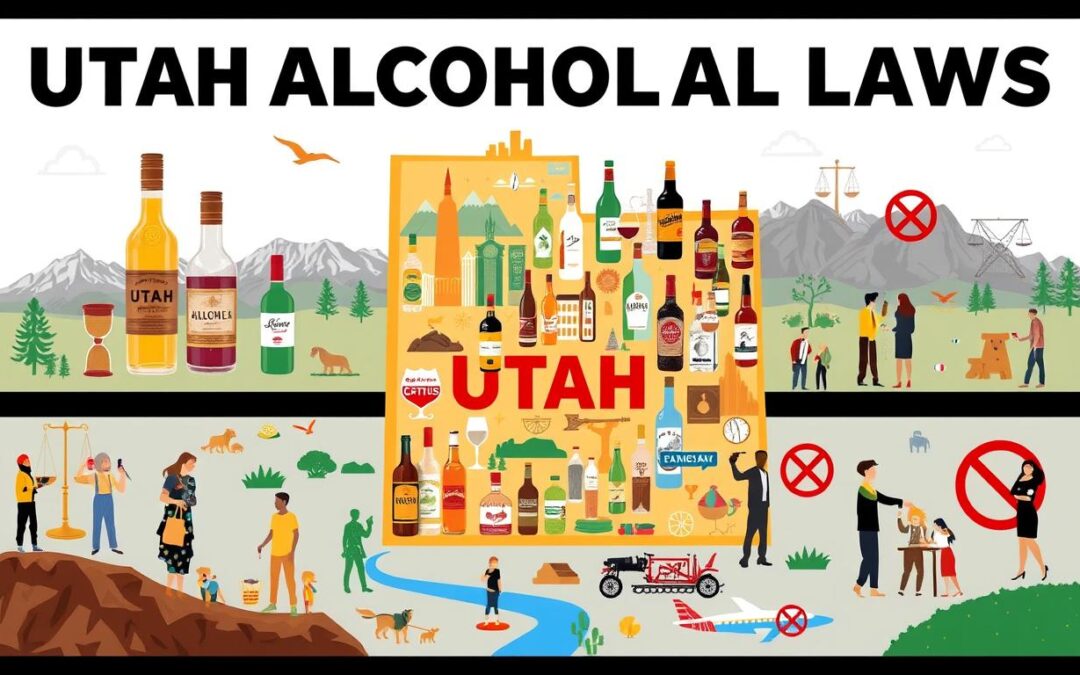Utah’s alcohol rules are quite strict, but it’s not a dry state. The laws here are among the toughest in the U.S. People visiting or living in Utah face a special set of rules. These rules make Utah different from other places.
The question “is utah a dry state” is complex. You can buy and drink alcohol, but there are strict rules. The Utah Department of Alcoholic Beverage Control (DABC) controls these rules. This shows how Utah’s culture affects alcohol sales and use.
Utah manages alcohol differently than most places. The state runs over 50 liquor stores, mostly in cities. They control the sale of strong drinks. This affects how restaurants serve alcohol and how you can buy it.
Key Takeaways
- Utah is not a dry state, but has extremely strict alcohol regulations
- The DABC controls liquor sales through state-run stores
- Alcohol service is heavily regulated with specific pour and serving limitations
- Cultural and religious influences significantly impact alcohol laws
- Unique restrictions exist for alcohol content, serving sizes, and purchase methods
Overview of Utah’s Alcohol Regulations
Utah’s alcohol laws are quite unique in the U.S. They have been shaped by history, culture, and religion. These factors continue to influence alcohol rules today.
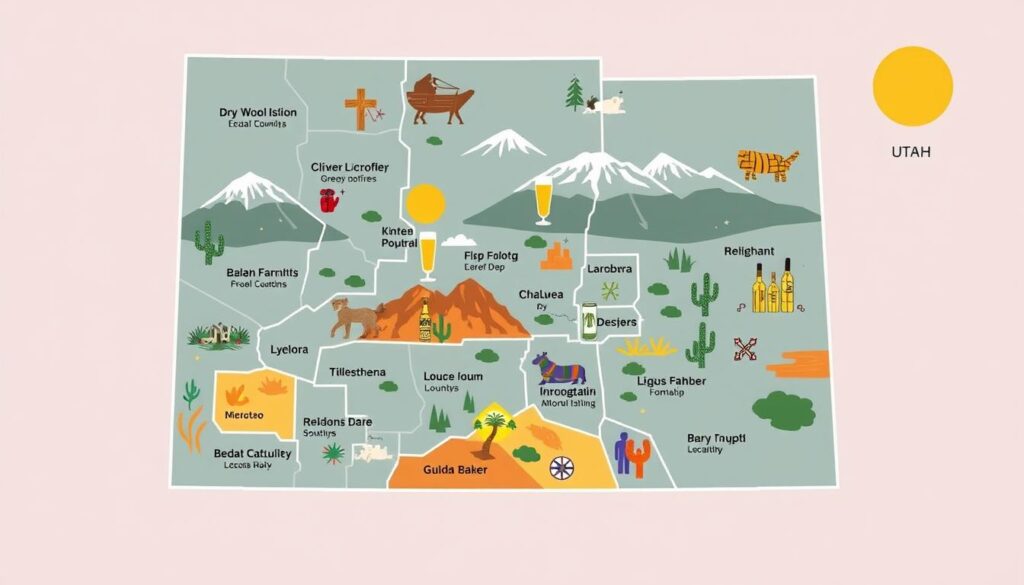
Historical Background of Utah Liquor Laws
The Utah Department of Alcoholic Beverage Services (UDABS) started regulating alcohol in 1935. Utah is one of 17 control states, controlling alcohol sales. The state’s unique alcohol control system emerged from a rich historical context.
- Utah was the first state to repeal the Eighteenth Amendment on December 5, 1933
- State-run liquor stores became the primary method of alcohol distribution
- Approximately 50 state-controlled liquor stores now operate throughout Utah
Role of Religious Influence
The Church of Jesus Christ of Latter-day Saints greatly influences Utah’s alcohol laws. About 55-66% of Utah’s population is LDS. The church’s teachings against alcohol have deeply shaped state policies.
“The influence of religious beliefs on alcohol regulations in Utah cannot be understated.” – Local Alcohol Policy Expert
State Control System
Utah’s alcohol control system is strict compared to other states. Key features include:
- Full retail control of beer above 5% ABV
- A 0.05% blood alcohol content (BAC) limit – the strictest in the U.S.
- Limited operating hours for state liquor stores
- Restricted alcohol sales in grocery and convenience stores
This strict approach shows Utah’s dedication to managing alcohol. It aims to control alcohol consumption through careful distribution.
Is Utah A Dry State
Utah is not a dry state, despite its strict alcohol rules. The idea that Utah is completely dry comes from its unique alcohol laws. These laws reflect the state’s history and conservative views.
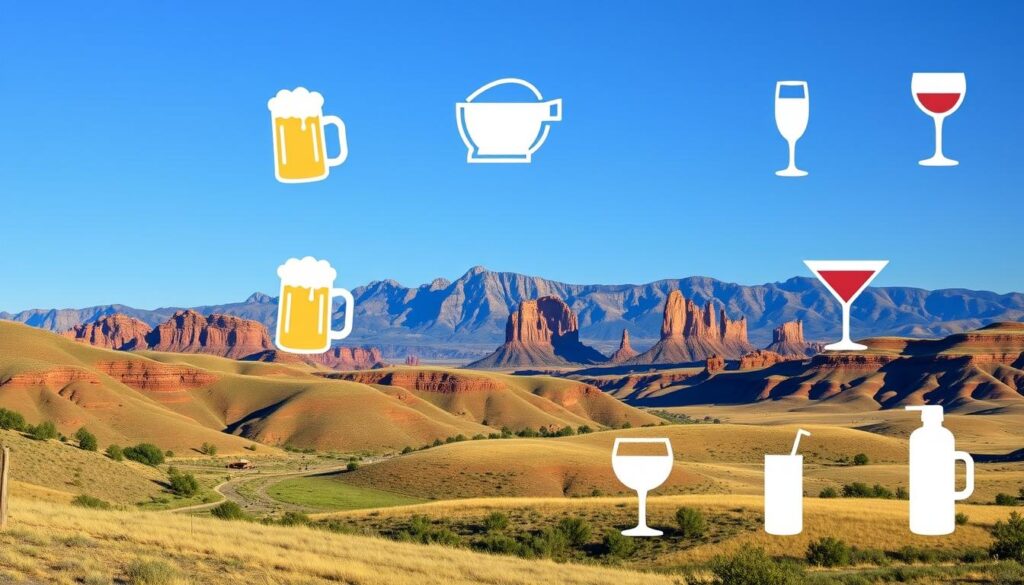
Alcohol is available in Utah, but with stricter rules than other states. The state’s laws on alcohol come from its religious and cultural background. This background is heavily influenced by the Church of Jesus Christ of Latter-day Saints.
“Utah’s alcohol laws are strict, but not prohibitive” – Utah Alcohol Control Commission
- Alcohol can be purchased in state-run liquor stores
- Restaurants and bars are permitted to serve alcohol
- Beer and wine are available in grocery stores
- Special licensing allows for alcohol service
Utah has led in alcohol regulation for a long time. It was the 36th state to approve the Twenty-first Amendment in 1933. This ended national prohibition. Utah has controlled liquor sales and distribution in the state ever sense 1935.
Even though Utah is not a dry state, it has strict alcohol laws. The state requires special permits for alcohol sales. It also limits alcohol content in drinks and controls where alcohol can be bought and drunk.
Interestingly, nine cities in Utah are completely dry, banning alcohol sales. This unique approach to alcohol laws makes Utah’s rules fascinating. It’s a key part of Utah’s culture and history.
Understanding Utah’s Alcohol Control System
Utah’s way of selling alcohol is unique and tightly controlled. It’s different from many other states. The state has strict rules for alcohol sales and drinking.
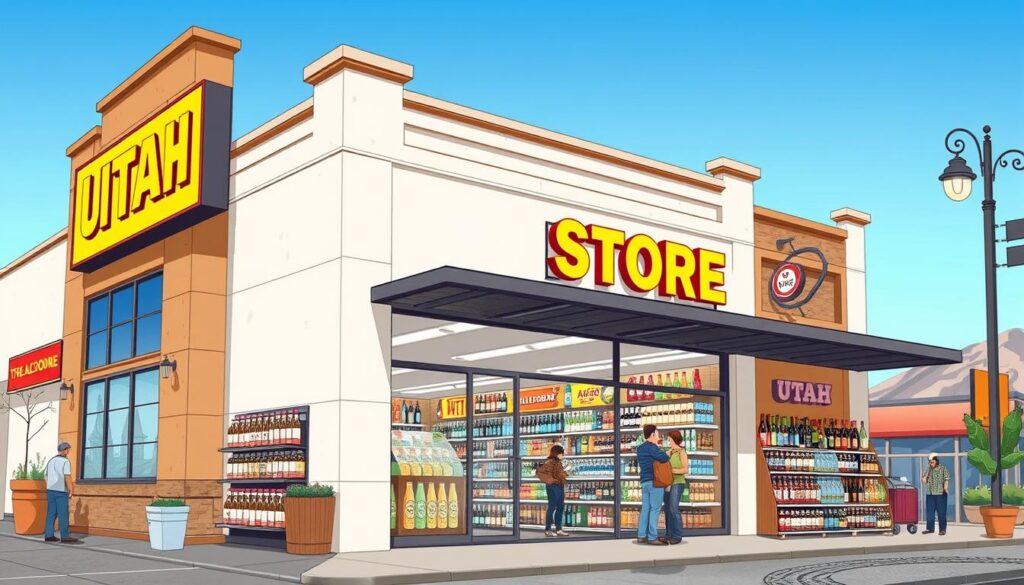
The Utah Department of Alcoholic Beverage Control (DABC) is key in managing alcohol sales. It has a network of liquor stores all over Utah. This ensures alcohol is sold and distributed responsibly.
State-Run Liquor Store Operations
Utah’s liquor store system has several important features:
- Over 50 state-operated retail stores across Utah
- Operating hours from 11 a.m. to 7 p.m. (some stores open until 10 p.m.)
- Mandatory ID checks for all customers
- 88% markup on spirits and wine over wholesale cost
Distribution Regulations
Utah has strict rules for alcohol distribution:
- All wine and spirits must be purchased from state-run stores
- Cocktails limited to 1.5 ounces of primary liquor
- Wine servings restricted to 5 ounces
- Mini liquor bottles prohibited (with specific exceptions)
Licensing Requirements
Businesses wanting to sell alcohol face complex licensing rules. The DABC oversees this system. It ensures alcohol is sold responsibly and follows state laws.
“Utah’s alcohol control system is designed to promote responsible consumption while generating significant revenue for state programs.”
| Revenue Category | Amount (FY2022) |
|---|---|
| Total Gross Liquor Sales | $557.45 million |
| State Treasury Return | $229.89 million |
| General Fund Allocation | $134.67 million |
| School Lunch Program | $54.5 million |
The system continues to evolve, with ongoing discussions about possible reforms to Utah’s alcohol regulations.
Legal Drinking Age and Purchase Restrictions
Utah has strict rules about drinking and buying alcohol. Like all 50 states, Utah’s drinking age is 21. This law covers buying, having, and drinking alcohol everywhere in the state.
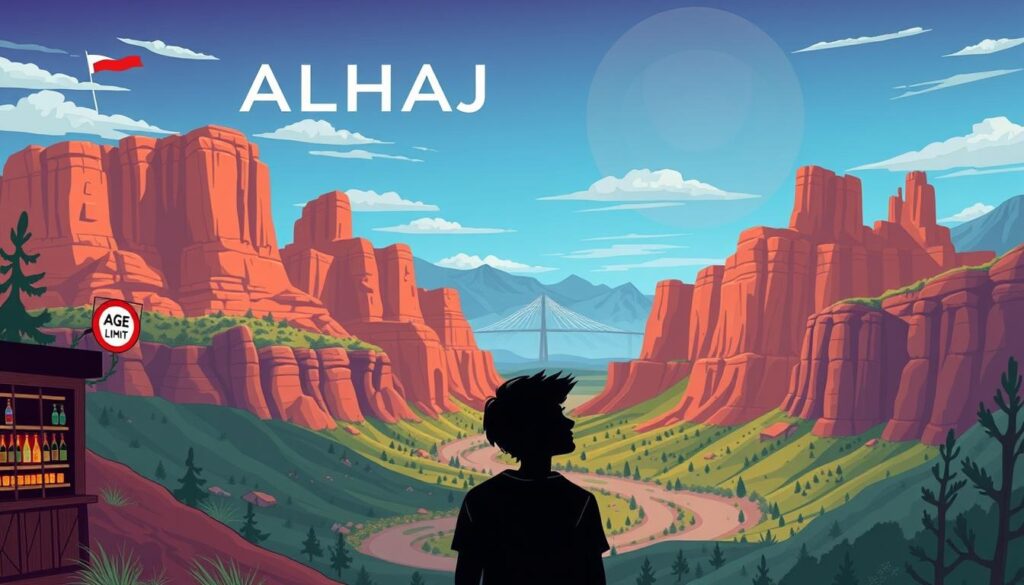
When you buy alcohol in Utah, you must show your age. The state asks for:
- Mandatory identification for anyone under 35
- A valid government-issued photo ID with your birthdate
- Strict checks on age at the time of purchase
There are specific rules for buying different types of alcohol in Utah:
| Beverage Type | Purchase Location | Alcohol Content Limit |
|---|---|---|
| Beer | Grocery Stores | 5% ABV or less |
| Heavy Beer | State Liquor Stores | Over 5% ABV |
| Spirits | State Liquor Stores Only | Regulated Quantities |
Penalties for underage drinking in Utah are serious. If caught drinking under 21, you might face:
- Fines up to $1,000
- Alcohol education programs
- Loss of driving privileges
“Protecting youth and promoting responsible alcohol consumption remains a priority for Utah’s alcohol regulations.”
Beer Laws and Regulations in Utah
Utah’s beer scene is unique, shaped by strict alcohol laws. To buy beer here, you need to know the rules about sales and distribution.
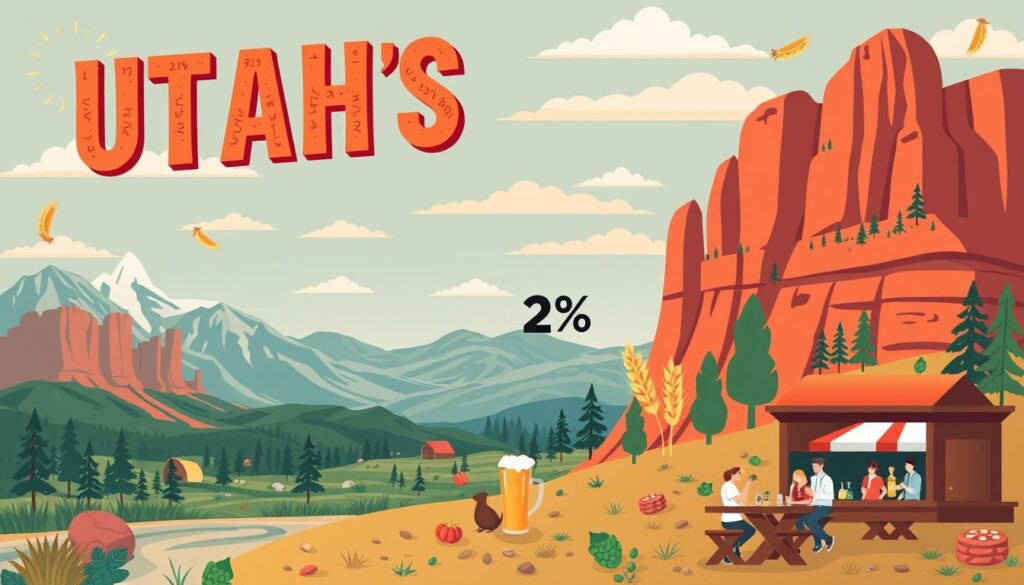
The state has clear guidelines that set it apart from others. These rules affect alcohol content and where and when you can buy beer.
ABV Limitations
Utah’s beer laws are strict about alcohol content. Here are some key points:
- Grocery and convenience stores can sell beer up to 5.0% ABV
- Beers over 5.0% ABV are only sold at state liquor stores
- Full-strength beers must be bottled or canned, with no draft sales in convenience stores
Where to Buy Beer
Where you can buy beer in Utah depends on its alcohol content:
| Location | Beer Type | Purchase Hours |
|---|---|---|
| Grocery Stores | Up to 5% ABV | 11:30 AM – 1:00 AM |
| State Liquor Stores | Over 5% ABV | 11:00 AM – 7:00 PM |
| Brewpubs | Full-strength | Varies by establishment |
Draft Beer Requirements
Draft beer sales have their own rules. Full-strength beers cannot be sold on tap in typical retail locations. But, brewpubs and special places can serve draft beers more freely.
“Utah’s beer laws reflect a careful balance between regulation and consumer access.” – Utah Alcohol Beverage Control Commission
With 38 brewing companies in the state, Utah is finding a balance. It combines tradition with modern tastes in beer.
Wine and Spirits Purchase Guidelines
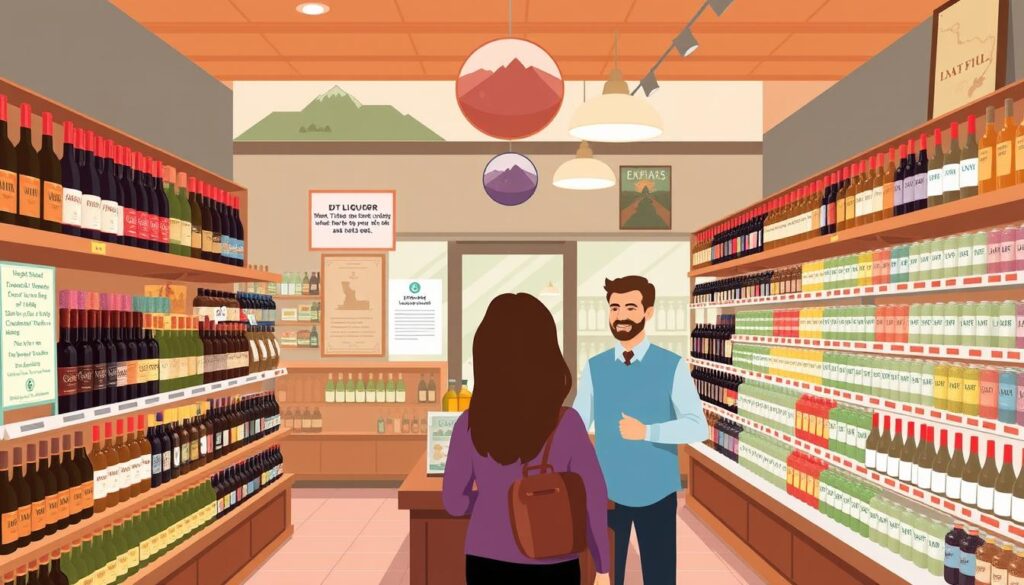
Shopping for wine and spirits in Utah means knowing the state’s rules. Utah has strict rules for buying alcohol, unlike many other places.
When you buy alcohol in Utah, you must get wine and spirits from state-run stores. These stores have a wide range of drinks but with some limits.
- 41 state liquor stores operate across Utah
- Stores are open Monday through Saturday
- Operating hours range from 11 am to 5-10 pm
- Closed on Sundays and major holidays
Purchasing limits and regulations are carefully enforced to maintain controlled alcohol distribution.
“Utah’s approach to alcohol sales reflects a unique blend of regulatory oversight and consumer accessibility” – Utah Alcohol Beverage Control Commission
At state liquor stores, you can buy packaged liquor, wine, and beer with more than 5% ABV. For unique finds, downtown Salt Lake City has three wine stores with special selections.
Here are some important things to remember:
- Valid identification is required (U.S. driver’s license, passport, or military ID)
- Maximum personal importation is nine liters of liquor
- Public consumption is strictly prohibited
Knowing these rules helps you buy alcohol smoothly in Utah’s controlled market.
Operating Hours for Alcohol Sales
Understanding utah alcohol laws is key. The state has strict rules for alcohol sales in bars and restaurants. This creates a unique scene for drinking in Utah.
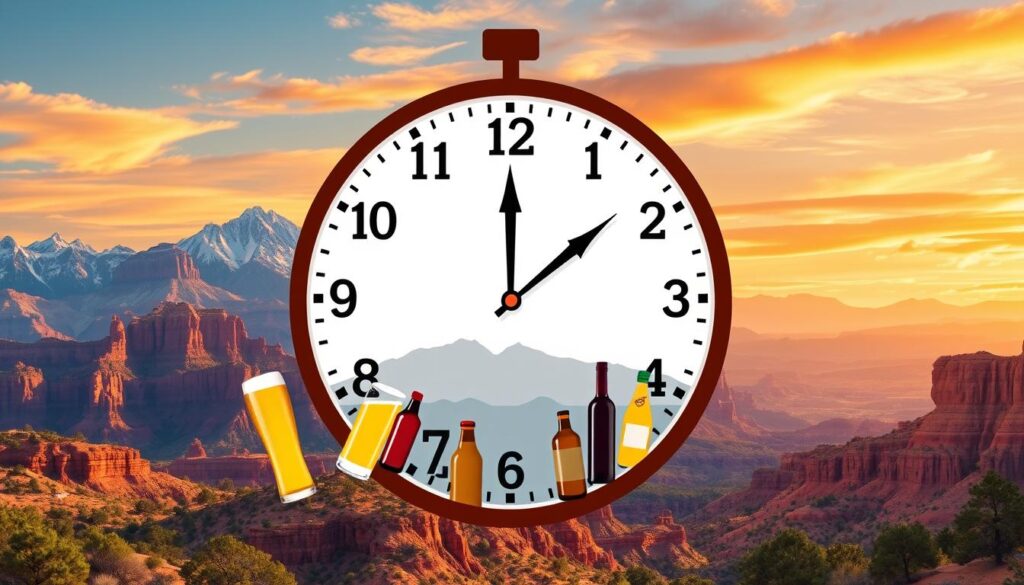
Utah sets specific times for alcohol sales. These times change based on the place and day. Knowing these rules helps plan social events better.
State Liquor Store Hours
State liquor stores have set hours:
- Open Monday through Saturday
- Standard hours: 11 a.m. to 7 p.m.
- Closed on Sundays and state holidays
Bar and Restaurant Service Times
Bars and restaurants have set times for serving alcohol:
| Establishment Type | Alcohol Service Hours | Additional Notes |
|---|---|---|
| Restaurants | 11:30 a.m. to 1:00 a.m. | Must serve food with alcohol |
| Bars | 11:30 a.m. to 1:00 a.m. | Limited to specific licensed locations |
Holiday Restrictions
Holidays bring extra rules for alcohol sales. Most state-run liquor stores close, limiting where you can buy alcohol.
“Utah’s alcohol laws are designed to balance responsible consumption with community standards.”
Plan ahead, mainly during holidays. This ensures you can buy alcohol legally.
Restaurant Alcohol Service Rules
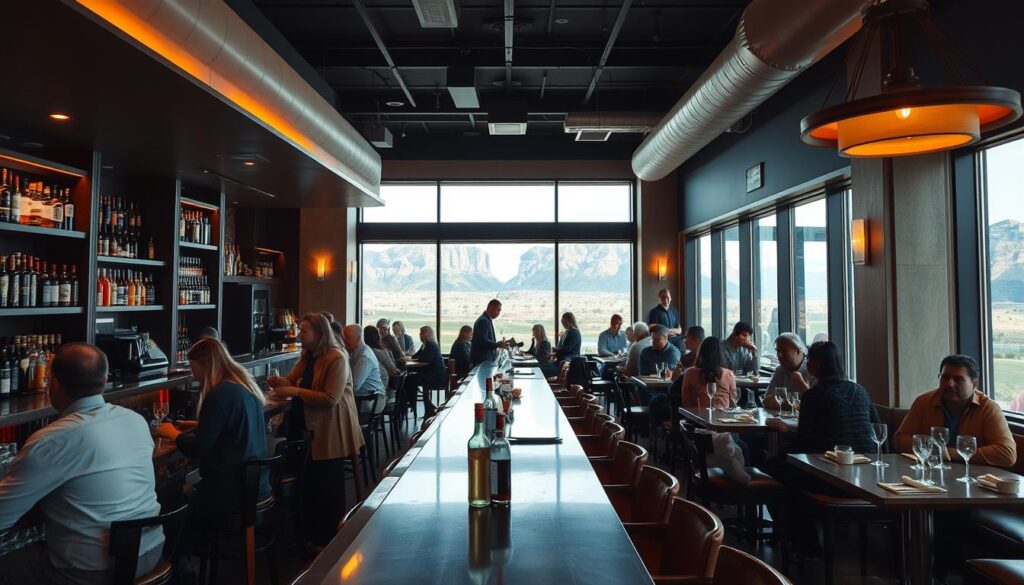
Understanding utah alcohol laws in bars and restaurants is key. Utah’s rules make dining with alcohol unique for those who want it.
Utah restaurants follow strict alcohol service rules. They must:
- Show “intent to dine” when ordering alcohol
- Buy food with alcohol orders
- Follow specific time limits for serving alcohol
Restaurants can start serving alcohol at 11:30 a.m. on weekdays and 10:30 a.m. on weekends and holidays. Alcohol service is tied to eating.
“In Utah, alcohol is a complement to dining, not the primary focus” – Local Restaurant Association
Patrons can choose from different drinks at restaurants. Here’s what’s available:
| Beverage Type | Service Limitations |
|---|---|
| Cocktails | Maximum 1.5 ounces, with additional 1 ounce from flavoring |
| Beer | Maximum 5% ABV, up to two drinks or 16-ounce equivalent |
| Wine | 5-ounce pour allowed with meal |
Utah’s bars and restaurants must follow age rules. Only those 21 and older can drink alcohol. Breaking these rules can lead to serious legal trouble for both places and customers.
Bar and Tavern Regulations
Utah’s alcohol laws shape the scene for bars and taverns in a special way. The state has rules that set these places apart from others. This shows Utah’s unique view on alcohol.
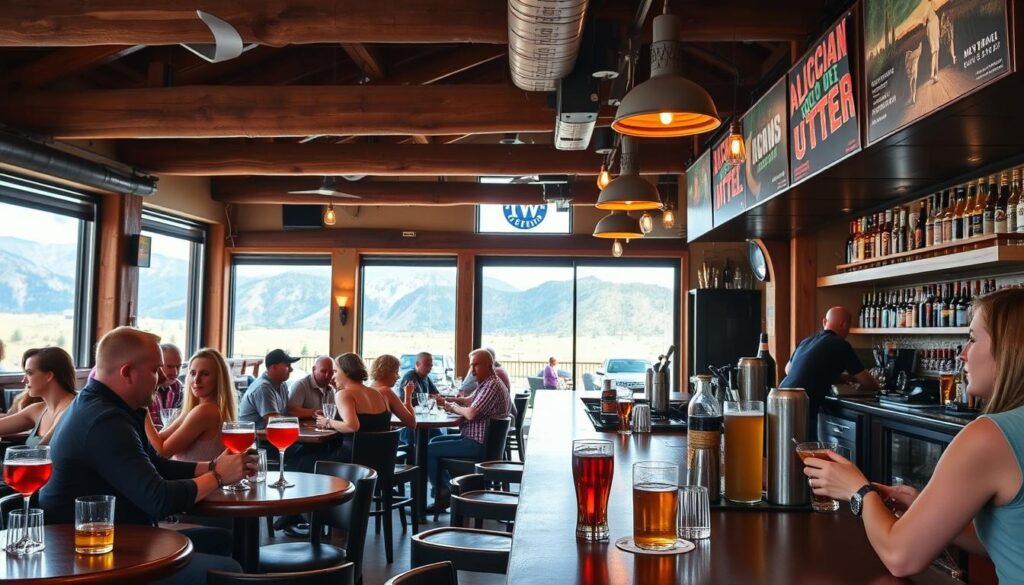
License Types for Utah Bars and Taverns
Bars and taverns in Utah face a detailed licensing system. The Utah Department of Alcoholic Beverage Services oversees this. The state has different alcohol licenses for various needs:
- Full-service liquor license
- Beer-only establishment license
- Limited-service restaurant liquor license
Service Requirements and Restrictions
Utah’s alcohol laws are strict for bars and taverns. Important rules include:
- Maximum cocktail volume limited to 2.5 fluid ounces of primary liquor
- Beer on tap restricted to 3.2% alcohol by volume
- Mandatory age verification for patrons appearing under 35
| License Type | Alcohol Permitted | Service Restrictions |
|---|---|---|
| Full Liquor License | All alcoholic beverages | No food requirement |
| Restaurant Liquor License | Wine and Beer | Must serve food |
| Beer-Only License | Beer under 5% ABV | Limited service hours |
To follow Utah’s rules, bars and restaurants need to be very careful. They must stick to the laws to keep their licenses. This ensures they serve drinks responsibly.
The complexity of Utah’s alcohol regulations reflects the state’s unique cultural and legal approach to beverage service.
Utah’s Unique Zion Curtain Laws
The Zion Curtain law is a key part of Utah’s liquor laws. It shows the state’s complex views on alcohol. This law was made to keep diners from seeing drinks being made.
Before 2017, bartenders had to mix drinks behind a wall. This wall was to keep customers from seeing. It was part of Utah’s effort to limit alcohol, mainly for kids.
“The Zion Curtain was more than a physical barrier – it represented Utah’s cultural approach to alcohol consumption.”
Important changes to the Zion Curtain law include:
- Removal of mandatory physical barriers in restaurants
- Restaurants must keep minors at least 10 feet away from alcohol preparation areas
- Estimated $350,000 in possible sales losses for affected restaurants
These changes show Utah’s views on alcohol are changing. Restaurants built before 2009 were not required to follow the original rules. This shows how the law was applied differently.
| Year | Regulation Status | Key Changes |
|---|---|---|
| Pre-2017 | Strict Partition Requirements | Mandatory Zion Curtain in restaurants |
| 2017 | Partial Reform | Physical barriers removed |
| 2023 | Current Regulations | Customers can carry drinks, 10-foot minor separation rule |
Even with changes, Utah stands out in its alcohol policies. With many Mormons and low alcohol use, the Zion Curtain laws show Utah’s deep cultural views on alcohol.
DUI Laws and Enforcement in Utah
Utah leads the nation in strict drunk driving laws. It has some of the toughest alcohol laws in the country. The state’s efforts focus on keeping everyone safe and cutting down on alcohol-related problems.
Blood Alcohol Content (BAC) Limits
Utah has the lowest BAC limit in the U.S., at 0.05%. This rule started on December 30, 2018. It makes Utah’s alcohol laws very strict.
- Maximum BAC: 0.05%
- Zero tolerance for drivers under 21
- Additional penalties for BAC over 0.16%
Penalties and Consequences
Breaking Utah’s drinking and DUI laws can lead to big problems. People face serious legal and personal issues. These go beyond just the legal penalties.
| Offense Type | Potential Consequences |
|---|---|
| First DUI (Class B Misdemeanor) | Potential jail time, fines, license suspension |
| Extreme DUI (BAC 0.16+) | Minimum 5 days jail, electronic monitoring |
| Multiple Offenses | Increased penalties, mandatory ignition interlock |
“Driving under the influence is not just a legal issue, it’s a public safety concern that affects everyone on the road.” – Utah Traffic Safety Authority
The state takes a strong stance with more than just laws. It includes mandatory substance abuse programs and electronic monitoring. Utah’s goal is to stop repeat offenders and keep communities safe.
Changes in Utah’s Modern Alcohol Laws
Utah’s liquor laws have changed a lot in recent years. The state is now more open to alcohol, moving away from strict rules. This shift makes alcohol laws more friendly to consumers.
Some important changes in Utah’s liquor laws include:
- Increased beer alcohol content in grocery stores
- Reformation of the controversial “Zion Curtain” regulations
- Expansion of craft brewing and distilling opportunities
The brewing scene has changed a lot, thanks to pioneers like Greg Schirf. Schirf Brewing Co. was the first to challenge old rules. This opened doors for other craft beer makers in Utah.
“We’ve seen a remarkable transformation in Utah’s alcohol industry over the past decades” – Local Brewing Expert
Important moments in Utah’s liquor laws include:
- 1987: First legal brewpub opened in Park City
- 2007: High West Distillery becomes first legal distillery in over a century
- 2023: More relaxed liquor laws
The craft brewing scene in Utah has grown a lot. Breweries like Uinta and Wasatch show the industry’s creativity. These changes show Utah’s move towards more flexible liquor laws, meeting modern tastes.
Impact on Tourism and Business
Utah’s alcohol laws have made tourism and business tricky. The state’s rules offer both challenges and chances for growth. Bars and restaurants face complex rules that shape how they operate.
The effects of Utah’s alcohol laws go beyond just drinks. Here are some tourism stats:
- 75% of residents think tourism is very important for Utah’s economy.
- 84% say Utah gives visitors a great experience.
- 66% believe tourism helps create jobs.
Zion National Park shows Utah’s tourism strength. From 2014 to 2019, park visits went up by nearly 50%. Visitors spent about $1,133 per visit, adding $434 million to local economies.
“Our alcohol laws might seem restrictive, but they haven’t stopped tourists from enjoying Utah’s unique spots,” says a local tourism official.
Utah’s bar and restaurant owners have found creative ways to work around the rules. They’ve come up with new ways to draw in customers while following the law. This has made Utah’s hospitality stand out.
Even with some limits, Utah is a popular place to visit. Cities like St. George are growing, and national park visits are up. Utah’s tourism scene is strong and changing.
Purchasing Alcohol at Special Events
Utah’s rules on alcohol get more complex at special events. You need to know the rules for festivals, big gatherings, and sports events. This helps when buying alcohol in Utah.
Olympic Games Alcohol Policy
The 2002 Winter Olympic Games changed Utah’s alcohol laws. The state relaxed its rules during the games. This led to new, more relaxed liquor laws in May 2003.
Festival and Event Alcohol Guidelines
There are special rules for buying alcohol at events in Utah:
- Only one drink per person at weddings and similar events
- Maximum 1.5 ounces of spirits per cocktail
- Wine servings limited to five ounces per glass
- Specialized event permits required for alcohol sales
Licensing and Regulations
Organizers of events must follow strict alcohol laws in Utah. They need a retail license for serving alcohol. There are also age rules for those who serve drinks.
“Purchasing alcohol in utah during special events requires careful attention to local regulations and licensing requirements.”
Recent Regulatory Updates
| Event Type | Alcohol Restrictions | Permit Requirements |
|---|---|---|
| Weddings | 1 drink per person | Special event license |
| Festivals | 5% ABV beer limit | Temporary alcohol permit |
| Sporting Events | 1.5 oz spirits per cocktail | Venue-specific license |
Knowing these rules helps ensure alcohol is served right and legally at Utah’s special events.
Local Variations in Alcohol Laws
Utah’s alcohol laws are complex and vary by location. The state has a broad framework, but each county and city can add its own rules. These rules affect how and where you can buy and drink alcohol.
These local rules change many things about alcohol:
- Licensing needs for places that sell alcohol
- Rules on when and where you can buy alcohol
- Local rules on where you can drink
- How local police enforce alcohol laws
Some Utah counties have stricter alcohol laws than others. Rural areas often have stricter rules, showing the local values and who lives there.
“Local alcohol regulations reflect community standards more than statewide policies.” – Utah Alcohol Policy Expert
Before buying or drinking alcohol in Utah, it’s smart to check the local laws. Knowing these rules can help avoid legal trouble.
| County | Alcohol Sales Restrictions | Licensing Complexity |
|---|---|---|
| Salt Lake County | Standard State Regulations | Moderate |
| Utah County | More Conservative Restrictions | High |
| Weber County | Moderate Local Variations | Medium |
To understand these local rules, you need to look at local laws and talk to local officials. It’s important to stay informed.
Identification Requirements and Valid Forms
Understanding Utah’s strict ID rules is key to following the drinking age laws. When buying alcohol in Utah, you must know what IDs are okay.
The drinking age in Utah is 21, just like the rest of the country. To buy alcohol, you need a valid ID from the government that fits certain rules.
Acceptable Forms of Identification
- Valid U.S. Passport
- Valid Driver’s License
- Official Military Identification Card
- State-Issued Identification Card
Every ID must have critical details:
- A clear photo of you
- Your full legal name
- Your birthdate
- When it expires
“Proper identification is your ticket to purchasing alcohol in Utah. No exceptions.”
Places that sell alcohol check IDs very carefully. People from other states or countries need a photo ID that meets Utah’s age rules.
Stores and bars can turn you down if your ID looks off or doesn’t pass the state’s checks for alcohol sales in Utah.
Conclusion
Utah’s alcohol rules are complex, making it hard to say if it’s a dry state. Despite strict laws, Utah has a lively craft beer scene. It boasts eighteen microbreweries and offers unique drinking spots that show off local culture and creativity.
The state’s alcohol rules find a middle ground between old traditions and new tastes. Places like Uinta Brewing use clean energy and plan big expansions. This shows Utah’s alcohol world is always changing, even with limits on alcohol and service.
So, is Utah a dry state? It’s not that simple. The rules let creativity flourish in a structured way. From Epic Brewery’s strong beers to carefully made cocktails, Utah shows a different side of drinking responsibly.
Utah’s alcohol laws mix culture, religion, and social views. Even with rules, local brewers and fans keep making amazing drinks. They work within the rules to create unforgettable experiences.

